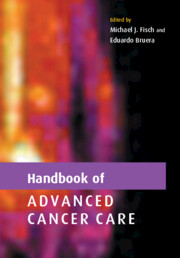Book contents
- Frontmatter
- Contents
- List of contributors
- Preface
- Acknowledgements
- PART I General concepts in oncology
- 1 Principles of diagnosis and staging
- 2 Principles of palliative chemotherapy
- 3 Principles of palliative surgery
- 4 Radiotherapy for palliation of symptoms
- 5 ABCs of clinical trials
- 6 Principles of cancer rehabilitation
- 7 Principles of palliative nursing
- 8 Ethics of decision making towards the end of life
- 9 Breaking bad news
- 10 The use of complementary/alternative medicine
- 11 Understanding “hospice”
- 12 Practical aspects of home care
- 13 Cultural differences in advanced cancer care
- 14 Implementing social services
- 15 Pastoral care
- 16 Bereavement
- Part II Primary tumors
- Part III Management of specific symptoms and syndromes
- Index
- References
13 - Cultural differences in advanced cancer care
Published online by Cambridge University Press: 04 August 2010
- Frontmatter
- Contents
- List of contributors
- Preface
- Acknowledgements
- PART I General concepts in oncology
- 1 Principles of diagnosis and staging
- 2 Principles of palliative chemotherapy
- 3 Principles of palliative surgery
- 4 Radiotherapy for palliation of symptoms
- 5 ABCs of clinical trials
- 6 Principles of cancer rehabilitation
- 7 Principles of palliative nursing
- 8 Ethics of decision making towards the end of life
- 9 Breaking bad news
- 10 The use of complementary/alternative medicine
- 11 Understanding “hospice”
- 12 Practical aspects of home care
- 13 Cultural differences in advanced cancer care
- 14 Implementing social services
- 15 Pastoral care
- 16 Bereavement
- Part II Primary tumors
- Part III Management of specific symptoms and syndromes
- Index
- References
Summary
Introduction
Culture could be defined as that complex whole which includes knowledge, belief, art, morals, law, custom, and any other capabilities and habits acquired by man as a member of society. The influence of culture is very pervasive, it is not restricted to religious rituals, and can be detected in several aspects of advanced cancer care.
Traditional issues in advanced cancer care related to culture
Traditionally culture has been associated with some issues considered to be relevant in the setting of advanced cancer:
Rituals of dying and death.
Manners of grieving and the grieving process itself.
Gender roles and family systems.
Emotional expression and sharing.
Dietary requirements and use of alternative therapies.
Beliefs about causation of illness.
New issues in advanced cancer care related to culture
There are several “new” issues emerging in the care of advanced cancer that are related to culture:
Terminal sedation versus euthanasia.
Last 48 hours of life versus traditions of Agonía.
Definition of “terminality.”
Hospice versus nonhospice traditions.
External versus internal locus of control and acceptance of death.
Perceived value of disclosure and cognition.
Communication – diagnosis disclosure – truth-telling.
Diagnosis disclosure
The last decade has witnessed a transition in health professionals in the UK and USA from “full open disclosure” to “conditional disclosure” of terminal diagnosis and prognosis when confronting dying patients. Simultaneously, research in countries such as Spain, Italy, Japan, Greece, Portugal, Israel, France, Colombia, and the Philippines has prompted the review of the long-held assumption that diagnosis disclosure is always in the best interest of the patient.
- Type
- Chapter
- Information
- Handbook of Advanced Cancer Care , pp. 113 - 116Publisher: Cambridge University PressPrint publication year: 2003

